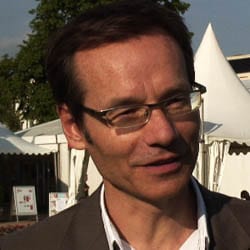Q&A with Dr Mark Lythgoe, Co-Director of the Cheltenham Science Festival
By Ben Stevens H P Stevens, on 2 June 2011
Dr Mark Lythgoe (pictured), Director of the Centre for Advanced Biomedical Imaging, talks about his other passion as Co-Director at the Cheltenham Science Festival.
The festival marks its 10th anniversary this year. How did it start and what was your involvement?
Ten years ago, there was a serious problem with the understanding of science. It was seen as somehow lowly to communicate about science rather than simply to do it.
So, we started out as just a handful of scientists who wanted to create a home from where we could communicate about science to the public.
Then, in 2006, I took over as Festival Director alongside Professor Kathy Sykes. Our vision was simple: science is a part of daily life and we wanted to touch as many people as possible.
We also wanted to create a diamond of a festival – crystal clear, tightly structured – that would make science fun, engaging and challenging.
We now get 40,000 visitors and it’s a total sell-out. It’s the Glastonbury of Science – people come to have fun and learn something. The key to this success is rock-solid speakers, who are wonderful communicators, and our advisory board – a group of 12 artists, engineers, scientists, who have been the eyes and ears of the festival since the start.
How does it fit in with your wider public engagement work?
We now have a whole generation of science communicators who cut their teeth at the festival. People like Brian Cox, Jim Al-Khalili and Mark Miodownik have shown that it’s okay to come out of the lab and communicate – they’ve made scientists human again.
They’re also willing to create a dialogue with the public, which is why there is such a big emphasis on Q&A at the Festival, with up to half of each session given over to it. Once you challenge an audience, there’s no stopping them, so we also have Talking Point, where people can carry on the discussion – sometimes for as much as two hours.
What’s different about this year’s festival?
It’s the first festival to go to six days and even then, there will be four events happening at any one time.
This year, we’ve grouped all the events into a series of themes – beautiful, entertaining, intriguing, inspiring, controversial and compelling – to give audiences an idea of what to expect from each talk.
There is also a new interactive area for called Area 42, which will showcase unseen new technology and what we call ‘undercover science’.
For the second year, we are holding Fame Lab International – our contest to find the next generation of science communicators – which will see competitors from 11 countries compete against each other.
What are the highlights?
The bar has been raised so much in terms of our speakers – they are professionals and work for months on their festival lectures.
From UCL, there’s Andrea Sella – the best chemistry demo guy in the world in my opinion – who’s risky and inspiring and is one of the brightest, most articulate speakers I’ve ever seen. He will be exploring the science of cannabis alongside Mark Miodownik, Clive Page and David Potter, which is guaranteed to be very entertaining.
Elsewhere, Dr Adrian Isaacs, a UCL postdoc, will be discussing transgenic animals; Professor Sarah-Jayne Blakemore (UCL Institute of Cognitive Neuroscience) will be talking about young minds; and one of our guest Directors this year, writer and graphic novelist Alan Moore, will be holding a psychogeography event with Iain Sinclair and then discussing where science meets fiction in conversation with comedian Robin Ince.
Other highlights include a Code Cracking Challenge that is being set by GCHQ and the Over Ambitious Demo Challenge, where five scientists are given five objects to demonstrate with, the audience then votes which is the best – it gets fiercely competitive!
Finally, I will be carrying out a live brain scan, where I will interview a member of the public on stage, take them to a local scan centre and then interview them with a live video feed back to the festival, so that the audience can ask them questions.
Why have you maintained such a long-standing relationship with the festival?
I love going back – I see it as a family. The sense of community, the energy and intensity is so profound. I spend the whole year waiting for it and then I come away inspired to do more the next year.
 Close
Close


